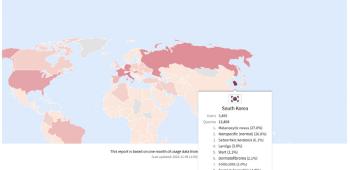The world's first investigation into the association of metabolic abnormalities between fatty liver and liver fibrosis...The possibility of early treatment for high-risk groups opens up
Aug 25, 2025
Domestic researchers have found for the first time in the world that a specific gene (PNPLA3) mutation can affect the progression of immune-mediated liver damage in patients with metabolic abnormal fatty liver disease (MASLD).
The research team consisting of Professor Lee Jae-joon (first author) of the Department of Gastroenterology at Eunpyeong St. Mary's Hospital (Director Bae Si-hyun), Professor Bae Si-hyun of the Department of Gastroenterology at Eunpyeong St. Mary's Hospital, and Professor Seong Pil-soo of the Department of Gastroenterology at Seoul St. Mary's Hospital (I.F. 5.5), a recent paper published in the online edition of the Journal of Gastroenterology (IF 5.5), an international academic journal in the field of blood pancreas 'A study on the association between the PNPLA3 I148M mutation.
Metabolic fatty liver disease (MASLD) is characterized by the accumulation of fat in the liver and metabolic diseases such as obesity, diabetes, and high blood pressure, and in some patients, it is a serious disease that can even lead to cirrhosis or liver cancer. Until now, it has been known that the PNPLA3 gene mutation (GG type) affects the progression of MASLD, but this study is of great significance in that it clarified for the first time how the mutation is involved in immune cell infiltration and inflammatory response in liver tissue.
In 2024, the research team prospectively recruited 70 patients with MASLD from Eunpyeong St. Mary's Hospital and Seoul St. Mary's Hospital and analyzed the PNPLA3 genotype from oral epithelial cells or liver biopsy tissue. In addition, the degree of CD3 (T cell) and CD68 (macrophage) infiltration was quantitatively evaluated for liver tissue by immunohistochemical staining.
As a result, the PNPLA3 GG type patient group (mutated group) had a higher rate of advanced fibrosis (F3 or F4) than the GC/CC type patient group (mutated or partially mutated group), and CD3? and CD68? immune cell infiltration increased significantly in the periportal region, causing an inflammatory response. In addition, in the GG-type patient group, the expression of genes that activate immune responses or cause liver fibrosis, such as CD8A, GZMB, CCL2, and TIMP1, was significantly higher.
This study is an important achievement that shows that the manner or speed of immune-mediated liver damage may vary depending on the gene possessed by each MASLD patient. In particular, if treatments that can control inflammation and immune responses in the liver are developed, it is expected that fibrosis progression can be slowed or prevented in genetically high-risk patients. In addition, it is also significant in that it has laid the foundation for patients to more accurately predict the risk of liver damage and start treatment early by checking their genetic information in advance.
Professor Lee Jae-jun said, "This study is of great significance in suggesting the world's first pathophysiological link that the PNPLA3 mutation induces immune cell infiltration and activation in the liver, which can lead to fibrosis." It could serve as a basis for predicting the prognosis of patients with MASLD in the future or designing new treatment strategies to target immune-related pathways."
Professor Bae Si-hyun explained, "This result shows the possibility of predicting the difference in fibrosis progression or treatment response depending on the PNPLA3 genotype, and will be a meaningful basis for realizing precision medical care in clinical settings in the future."
Professor Seong Pil-soo said that "the first genetic-immune-related study that highlighted the activation of immune cells as one of the important causes of deterioration of MASLD" is expected to contribute to elaborating treatment targets."," he said.
Meanwhile, the study was jointly participated by precision dielectric analysis company Xenohelix, and genetic analysis was performed using Genohelix's SNP-based precision dielectric analysis platform.
The research team consisting of Professor Lee Jae-joon (first author) of the Department of Gastroenterology at Eunpyeong St. Mary's Hospital (Director Bae Si-hyun), Professor Bae Si-hyun of the Department of Gastroenterology at Eunpyeong St. Mary's Hospital, and Professor Seong Pil-soo of the Department of Gastroenterology at Seoul St. Mary's Hospital (I.F. 5.5), a recent paper published in the online edition of the Journal of Gastroenterology (IF 5.5), an international academic journal in the field of blood pancreas 'A study on the association between the PNPLA3 I148M mutation.
Metabolic fatty liver disease (MASLD) is characterized by the accumulation of fat in the liver and metabolic diseases such as obesity, diabetes, and high blood pressure, and in some patients, it is a serious disease that can even lead to cirrhosis or liver cancer. Until now, it has been known that the PNPLA3 gene mutation (GG type) affects the progression of MASLD, but this study is of great significance in that it clarified for the first time how the mutation is involved in immune cell infiltration and inflammatory response in liver tissue.
In 2024, the research team prospectively recruited 70 patients with MASLD from Eunpyeong St. Mary's Hospital and Seoul St. Mary's Hospital and analyzed the PNPLA3 genotype from oral epithelial cells or liver biopsy tissue. In addition, the degree of CD3 (T cell) and CD68 (macrophage) infiltration was quantitatively evaluated for liver tissue by immunohistochemical staining.
As a result, the PNPLA3 GG type patient group (mutated group) had a higher rate of advanced fibrosis (F3 or F4) than the GC/CC type patient group (mutated or partially mutated group), and CD3? and CD68? immune cell infiltration increased significantly in the periportal region, causing an inflammatory response. In addition, in the GG-type patient group, the expression of genes that activate immune responses or cause liver fibrosis, such as CD8A, GZMB, CCL2, and TIMP1, was significantly higher.
This study is an important achievement that shows that the manner or speed of immune-mediated liver damage may vary depending on the gene possessed by each MASLD patient. In particular, if treatments that can control inflammation and immune responses in the liver are developed, it is expected that fibrosis progression can be slowed or prevented in genetically high-risk patients. In addition, it is also significant in that it has laid the foundation for patients to more accurately predict the risk of liver damage and start treatment early by checking their genetic information in advance.
Professor Lee Jae-jun said, "This study is of great significance in suggesting the world's first pathophysiological link that the PNPLA3 mutation induces immune cell infiltration and activation in the liver, which can lead to fibrosis." It could serve as a basis for predicting the prognosis of patients with MASLD in the future or designing new treatment strategies to target immune-related pathways."
Professor Bae Si-hyun explained, "This result shows the possibility of predicting the difference in fibrosis progression or treatment response depending on the PNPLA3 genotype, and will be a meaningful basis for realizing precision medical care in clinical settings in the future."
Professor Seong Pil-soo said that "the first genetic-immune-related study that highlighted the activation of immune cells as one of the important causes of deterioration of MASLD" is expected to contribute to elaborating treatment targets."," he said.
Meanwhile, the study was jointly participated by precision dielectric analysis company Xenohelix, and genetic analysis was performed using Genohelix's SNP-based precision dielectric analysis platform.
|
This article was translated by Naver AI translator.














